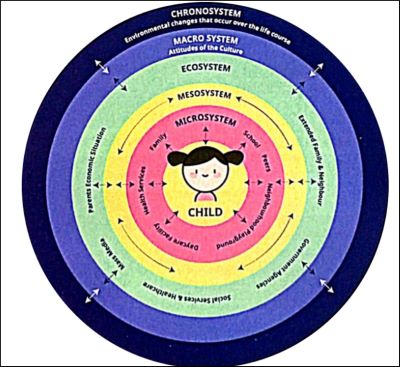Context-
Pre-primary education, catering to children aged 3 to 6 years, lays the foundation for lifelong learning. During this crucial developmental phase, children acquire fundamental skills like language, numeracy, motor, and social skills. Research underscores the importance of early education in shaping children's cognitive and social abilities, setting the stage for future academic success. In India, the focus on early childhood education has gained momentum, aligning with Sustainable Development Goal (SDG) 4, which emphasizes inclusive and equitable learning opportunities for children aged 3-6. However, while policy frameworks and initiatives have been established, the readiness of Anganwadis, pivotal in delivering early childhood education, warrants scrutiny.
The Importance of Early Childhood Education
The early years mark a critical period for cognitive and socio-emotional development. Recognizing this, the India Early Childhood Education Impact Study 2017 highlights the positive correlation between quality early education and enhanced learning outcomes in primary grades. Target 4.2 of SDG 4 underscores the imperative of inclusive education for children aged 3-6, advocating for holistic development and equitable learning opportunities.
Policy Interventions and Frameworks
India's policy landscape concerning early childhood education evolved with the adoption of the National Early Childhood Care and Education Policy in 2013. The National Education Policy 2020 underscores play-based learning methodologies, emphasizing four models for early childhood education delivery. These models include Anganwadi centers, pre-primary sections within schools, and standalone preschools, each designed to foster inclusive learning environments.
NEP 2020 and Early Childhood Care and Education
The Early Childhood Care and Education (ECCE) initiative stands as a powerful equalizer, with its potential to ensure that all children, regardless of background, are adequately prepared for formal schooling by 2030. The envisioned expansion of the Right to Education Act aims to encompass preschool education, spanning the crucial three years preceding Grade 1. Central to this expansion is the proposal for a comprehensive curricular framework tailored to children aged 3 to 8, emphasizing play, exploration, and multilingual exposure from an early age.
By 2025, the policy envisions universal access to high-quality early childhood care and education for children aged three to six, facilitated through both schools and Anganwadis. These institutions will not only foster the holistic development of children within their premises but also extend support to families with children under three years of age within their homes. The holistic approach envisaged by the policy is expected to generate a significant positive impact across society, fostering a supportive environment for children's growth and development.
Challenges in Early Childhood Education
● Issues of Separation and Language barrier:
For young children, pre-primary education marks their initial exposure to structured learning environments. However, this transition poses various challenges, including separation anxiety, socialization difficulties, and language barriers. The National Early Childhood Education (ECCE) Curriculum Framework acknowledges these obstacles, emphasizing the role of parents, families, and communities in fostering informal, play-based learning environments. Multilingual classrooms are advocated to accommodate India's linguistic diversity, ensuring inclusive educational practices.
● Issues in Implementation:
Despite policy directives, the practical implementation of early childhood education faces impediments, particularly concerning India's urban migrant population. Migrant families encounter barriers in accessing quality pre-primary education, exacerbated by limited awareness and language disparities. The National Early Childhood Education Curriculum Framework underscores the importance of multilingual classrooms but acknowledges the challenges in execution. Key questions arise regarding the preparedness of Anganwadi centers and educators to cater to diverse linguistic and cultural needs. Insufficient staffing, inadequate training, and resource deficiencies hinder the delivery of quality early education, exacerbating disparities.
● Training and Resources:
A critical aspect of enhancing early childhood education lies in investing in human resources. Trained educators play a pivotal role in nurturing children's development, yet the profession often lacks recognition and adequate remuneration. More training and support is needed to ensure educators' ability to address the diverse needs of young learners. Additionally, children with special needs require specialized attention and resources, highlighting the need for comprehensive training programs and inclusive practices within early childhood education settings.
Socio-Economic Implications
Quality early childhood education transcends academic preparedness, yielding socio-economic benefits. By enabling maternal workforce participation and reducing childcare burdens, early education contributes to economic empowerment and reduces dropout rates among older children. For marginalized communities, access to quality early education serves as a catalyst for social mobility, narrowing educational disparities, and enhancing life chances.
The Case for Increased Investment
While India's commitment to early childhood education is commendable, sustained investments are imperative for meaningful impact. Public spending on early childhood care and education, coupled with empowerment initiatives for Anganwadis, can facilitate equitable access and foster inclusive learning environments. However, effective implementation requires a nuanced understanding of children's diverse needs and contextual challenges.
Conclusion
The journey towards quality early childhood education in India is characterized by commendable strides and persistent challenges. Empowering Anganwadis and enhancing educator training are pivotal steps towards realizing inclusive and equitable learning opportunities for young children. While policy frameworks provide a roadmap, their effective implementation hinges on addressing systemic barriers and resource deficiencies. By prioritizing early childhood education and investing in human capital, India can lay a robust foundation for lifelong learning and socio-economic development. The path ahead demands concerted efforts, guided by sensitivity and a steadfast commitment to nurturing India's youngest learners.
|
Probable Questions for UPSC Mains Exam-
|
Source- ORF









